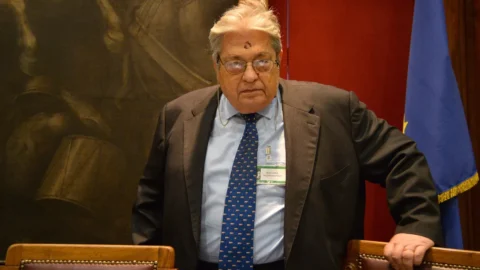Carlo Cottarelli he does not escape the crowds. And he, former spending review commissioner and now executive director of the International Monetary Fund, together with Hervè Falciani, the banker who revealed the secrets of Europe's great tax evaders, yesterday's rock star of the Trento Economy Festival. So much so that the hall of the municipal library set up for the debate is narrow and dozens of people are left outside. Inside the seats are sold out immediately and people are crowded standing along the shelves of books.
“I wrote this book because it seemed to me that there were too many urban legends about public spending”, began Cottarelli, who here in Trento is the author of the book “The shopping list. The truth about Italian public spending and how it can be cut" just published in May 2015.
THE METROPOLITAN LEGENDS ABOUT SHOPPING
Cottarelli gives no room for easy populism or defeatist tones. “It is an urban legend that in Italy it has never been possible to reduce spending, understood as primary, without interest – he immediately said – in reality, primary expenditure from 2009 to 2013 decreased by 10% because nominal expenditure was constant but was eroded by inflation”. The expenditure of the State, of the Municipalities, of the Regions (calculated without health care), of the Provinces has decreased. And, to be honest, only pensions are the only sector that has also increased in nominal terms (+10%).
“Pensions and health care – he specified – have actually been the least cut areas”. On the matter, Cottarelli also specified that "it is necessary to distinguish the rights that can be explained economically from those that exist historically, on pensions, distinguish between those obtained with contributions and those with wages".
Another urban legend is the fact that our expenditure is much higher than that of the other major European countries. "We spend the same on primary spending - he said - but we can't because we pay more interest on the debt". On the other hand, progress was made in 2015 with a net cut of 8 billion euros, 0,25% of GDP. "Some progress has been made - he commented - which is also why it is difficult to make further progress".
CLERK, LAMP POST AND CULTURE
Some anecdotes on which he has not skimped explain well, however, that, if you want, there are things to do. Here I am. “When they introduced e-mail – she said – a lot of work ministry clerks it has become redundant, but the number of clerks has not been reduced. Now these clerks don't do much and spend the day on the internet." And it was just that. "I was told - he added - that in the Ministries there are huge corridors that are not used, you could save on rents, but you can't because the desks of the clerks have to be there". Overall, Cottarelli underlines that it is possible to further reduce personnel: after the 300 units cut in recent years there is still room thanks again to the block on turnover and mobility. "Then we should try to internalize services that the Public Administration buys from outside", he explained, citing the case of the Court of Milan, where the dramatic recent news has brought the issue back into the spotlight.
“Even before what happened (the shooting at the hands of a defendant in a trial some time ago, ed) – he said – I had underlined in the book that the security services were managed by security guards and I proposed to use internal personnel resources”. A solution that would also make it possible not to involve members of the forces of order. But trivially Cottarelli also gave indications of common sense, like a good family man. Including, one of his warhorses, turn off unnecessary lights. That is, saving on public lighting where it is technically possible. “There were many inaccuracies on this too – he explained – I proposed to use efficient lighting, without dispersions and with efficient bulbs. And then I proposed turning off a few lights, but not where people walk, in the streets with high traffic traffic. On the Rome-Fiumicino you can go with the lights off since there are street lamps every 50 meters that use up a lot of energy”.
And for a moment Cottarelli had the illusion that, by dint of insisting, something had moved: passing on the Rome-Fiumicino one evening he saw that the street lamps were off. "I finally thought - he said with a joke - but then I read that someone had stolen the copper wires ... still creating savings for the Public Administration". Finally, if for Cottarelli there is not a single sector on which to relentlessly with the cuts, the reduction in spending must in fact concern all areas, it is still true that "for culture and education, especially in relation to other countries you don't spend enough and you need tohad to spend more".





